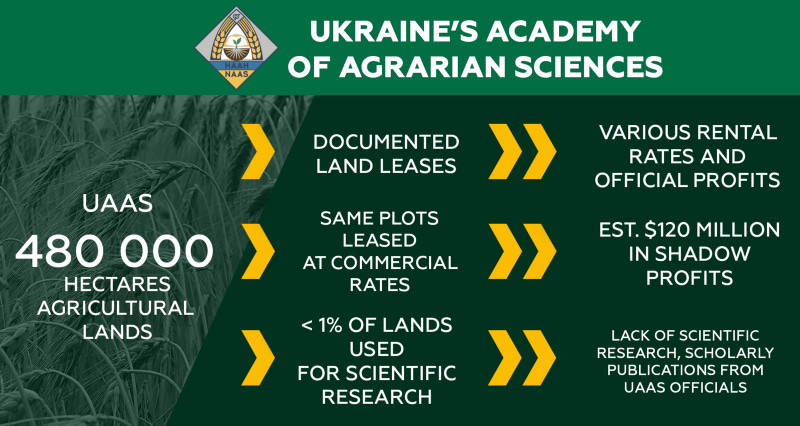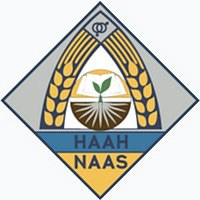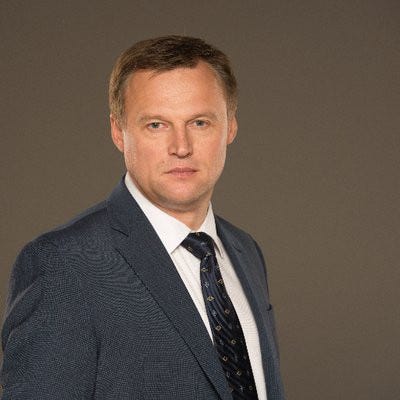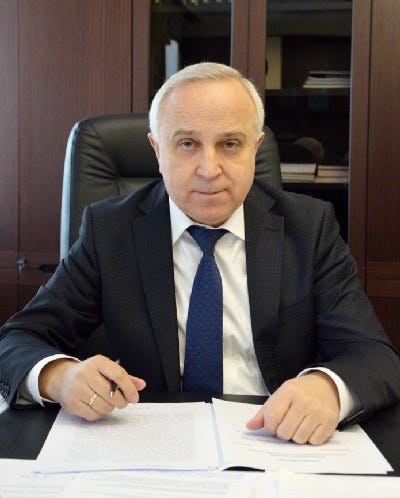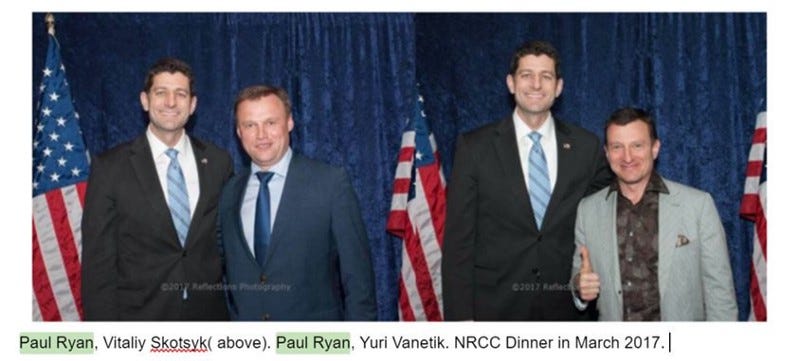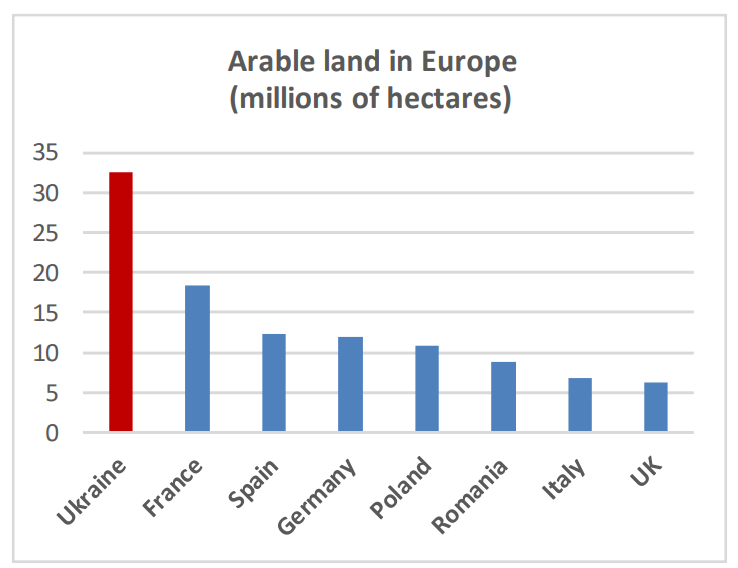Cash cows block free land market in Ukraine
KYIV. The price of one hectare of farmland in Ukraine, if the moratorium on the sale of farmland is annulled, could jump overnight to UAH 50,000–60,000, or about $2,000, according to Ukraine’s Acting Minister for Agrarian Policy and Food Maksym Maksymiuk.
That would mean selling just ten hectares of land would make you rich enough to afford a pair of Zilli crocodile shoes, which today cost around $10,000.
Ukraine’s moneyed agrarians and well heeled agents made the rounds in Washington, D.C. during 2017, arguing foreign cash would flood into the country if the moratorium on farmland sales was lifted. So, instead of lifting the ban, they extended it to protect their vested interests.

Ukraine’s $100-million cash cow
The office of Agrarian Party of Ukraine Chairman Vitaly Skotsyk is located in Ukraine’s Academy of Agrarian Sciences, which is headed by Yaroslav Gadzalo, a two-time member of the party’s presidium. It holds more than 3,000 seats in local regional councils and is the firth largest party nationally.
The academy is Ukraine’s third largest owner of agricultural land, controlling more than 478,000 hectares, or an area about the size of Delaware.
The estimated amount of undeclared cash Ukraine’s Academy of Agrarian Sciences makes each year by illegally renting publicly owned farming lands to commercial agribusinesses exceeds $100 million, or 10,000 pairs of Zilli shoes.
_________________________
As of March 2017, Ukraine’s Academy of Agrarian Sciences was the third largest owner of agricultural land, controlling more than 478,000 hectares.
That’s 1,181,161 acres, or 1,845 square miles.
__________________________
The academy is a piggy bank for Ukraine’s Agrarian Party, which steadfastly opposes lifting the moratorium on farmland sales. The academy reports substantially less in earnings per per hectare than any of the country’s top ten largest agriholdings. Much of the margin reportedly winds up their pockets.
Vitaly Kravchenko and Maksym Mordovtsev in November 2017 published an investigation of shenanigans at Ukraine’s Academy of Agrarian Sciences (Korrespondent magazine, №42). The report estimated the academy receives annually in excess of of $100 million.
These enormous profits are not accounted for anywhere, even though the state institution receives UAH 740 million annually for scientific research.
Why research anything when you’re putting $100 million cash in your pockets?
Ukraine’s Beltway bandits: Vanetik, Skotsyk and Gadzalo
Ukrainian-American businessman Yuri Vanetik sits on the board of Great America PAC and is the Finance Co-Chair of the New York office of the Republican Party. During the 2016 election he helped raise over $30 million dollars for the Trump presidential campaign. Vanetik in 2017 helped the political party Skotsyk and Gadzalo leaders lead to keep Ukraine’s farmland sale moratorium in place.
“The [Agrarian] party seeks to explain the importance of agriculture as a sector in Ukraine, the dangers and benefits of Ukraine’s agriculture.” — U.S. Foreign Agent Registration Act (FARA)
In October 2017, Vanetik co-authored an article with Skotsyk entitled “Ukraine Is Not Ready For A Free Market In Agriculture Land.” The article was published two days after Vanetik submitted FARA paperwork indicating he would not prepare or disseminate informational materials on Skotsyk’s behalf.
Vanetik has authored many counterintuitive op-eds about Ukraine. In July 2014, he famously argued against imposing sanctions on Russia for invading eastern Ukraine and annexing Crimea in an piece, titled “Sanctions on Russia works in Putin’s favor.” In September 2015, Vanetik again regurgitated Kremlin propaganda, calling on decision-makers in Washington to ignore calls to provide arms in an op-ed, titled “Only radical change in U.S. policy can save Ukraine.”
According to Erin Lankau, Vanetik’s Foreign Agent Registration (FARA) documents reveal how U.S. media outlets are publishing propaganda from foreign governments, while Republican Party leaders provides unfettered access to foreign agents and the U.S. Department of Justice refuses to enforce the law
Lankau writes Vanetik likely worked with Skotsyk before July 2017. Both attended several private GOP events and private meetings with GOP leadership in early 2017. The first such visit to the U.S. was for the National Republican Congressional Committee (NRCC) fundraising dinner in March 2017. This visit occurred just six weeks after Vanetik held a mysterious dinner meeting in New York City with another foreign agent for Ukraine — Paul Manafort, who is also a registered agent for Ukraine.
In May and June 2017, Skotsyk made two more visits to the U.S. — visiting with GOP leadership, attending conferences, and socializing at the Trump International Hotel in D.C.
Serfdom, Inc.
After the USSR imploded in 1991, Ukrainians whose forebears had been victims of collectivization were awarded parcels of land averaging four acres and together totaling 166,000 square kilometers (64,000 square miles), or an area almost the size of Florida. Ukraine’s parliament in 2001 passed a law prohibiting the sale and purchase of these plots, a ban that has been extended nine times.
A World Bank report published in October 2017 disagrees with almost everything Skotsyk and Vanetik opine. Though agriculture is the largest single contributor to goods sold abroad, a farm productivity and yields in Ukraine are a fraction of what they are in other European countries.
Experts working for the the International Monetary Fund and Ukraine’s own government say the moratorium on land sales undermines livelihoods of a large number of rural landowners. As a result, a large number of rural landowners are deprived of a fair return on one of their most valuable assets. Low land rents discourage productive use of the Ukraine’s arable land and fuel corruption.
Along with Agrarian Party leaders Skotsyk and Gadzala, Yulia Tymoshenko, the former prime minister and current leader of the 19-member Batkivshchyna Party faction in parliament, opposes ending the farmland sales moratorium, warning of “hunger and a lack of drinkable water.”
Since 2008, her party has relied more on agribusiness, according to public disclosures.
Top Ukrainian government officials responsible for the management of state and communal land continue to benefit enormously from farmland rental schemes. The moratorium also enables hired thugs to strong-arm small land owners into switching partners on leasing contracts, giving rival companies and politicans with ties to Ukraine’s Academy of Agrarian Sciences and Agrarian Party an unfair advantage.



